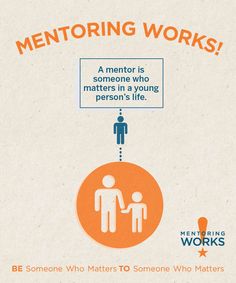Lesson 5: Mentors and Role Models

Learning Outcomes
Upon completion of this lesson's material, students will be able to:
- Explain professionalism in early childhood by gaining perspective from a professional in the field
- Discuss what you believe makes an early childhood educator successful
Teaching
Growing up, some people identified themselves with a particular mentor or role model. These mentors or role models could have been a famous actor or sports player, maybe it was their second grade teacher or a parent. In some cases, it could have been an imaginary figure that they believe has all of the best qualities that they wish to grow up with themselves.
A mentor or role model can be identified as someone who is an experienced and trusted individual. This person provides guidance and advice in times when the mentee is struggling or looking to improve a skill.
A mentor or role model can change over time. For instance, when I was a young girl I looked up to my mothers best friend to teach me how to do braid hair and twirl in a skirt. As I got older I connected with other figures and then began to latch on to early childhood educators. I found myself watching the way they interacted with the children and wanted to be just like them. I looked up to the way they spoke softly, managed to make the children laugh when they were hurt, and how they seemed to always be smiling. When I got my first job, I scrambled to find that one person that I admired and looked up to, but I identified her as one that had skills I did not. She was organized, said what she meant and always had the right answer. She encouraged me to think outside of the box and encouraged me to consider other perspectives.
Having someone to look up to is a wonderful way to recognize WHAT exactly it is that you aspire to be. In no way, am I encouraging anyone to change who they are, but I DO encourage you to think about what qualities you want to work on and identify someone that you can learn from. Watching others who have refined skills in certain areas can help you reflect about what you need to do next to grow as an educator.
Assessment
Lesson 5 Assignment
Some of you may not recall a mentor or role model from when you are growing up and some of you may have several. I want you to think though.....right now.......in this very moment...... who do you look up to in the early childhood field? Who do you most respect and idealize?
For this assignment, I want you to choose someone in the early childhood field that holds characteristics that you wish to acquire. This person could be anyone in the early childhood field but you must be able to contact them to do an interview. Set up an interview and ask the following questions. NOTE – You must develop 2 questions of your own in addition to the ones below.
- How did you know that you wanted to work in early childhood education?
- Who inspires you to continue in the field?
- What do you believe are essential qualities for an early childhood educator to have?
- Do you have any advice for others (such as myself) who are acquiring new knowledge and skills to move forward in the field?
- Two additional questions developed by the students. (You must come up with 2 additional questions.)
Write a one-page summary with your answers to the following questions in addition to the interview questions and responses.
- Who did you choose and why? EXPLAIN
- What is his/her title and what is the impact their position has in early childhood?
- Did anything surprise you in their answers? EXPLAIN
- What is the most valuable thing you learned from this interview.
You must submit the interview questions and responses AND the 1-page summary! You will be graded according to the following rubric
1-4 INTERVIEW QUESTIONS AND RESPONSES |
0 Points |
10 Points |
20 Points |
2 STUDENT DEVELOPED INTERVIEW QUESTIONS AND RESPONSES |
0 Points |
10 Points |
20 Points |
INTERVIEWEE INFORMATION |
0 Points |
8 Points |
15 Points |
SURPRISES |
0 Points |
8 Points |
15 Points |
MOST VALUABLE LESSON |
0 Points |
10 Points |
20 Points |
GRAMMAR AND MECHANICS |
0 Points |
5 Points |
10 points |
Lesson 5 Discussion
I what way can YOU be a role model or mentor to other early childhood educators?